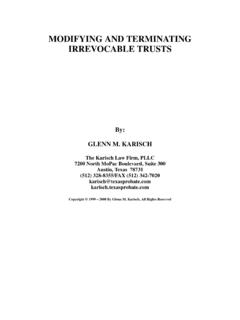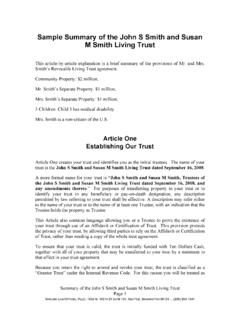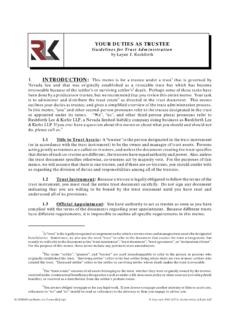Transcription of Memorandum to the Settlor and the Trustee - Rushforth
1 irrevocable TRUSTSM emorandum to the Settlor and the Trusteeby Layne T. Memorandum is for the Settlor (creator) and the Trustee (manager) of an irrevocable trust . There is a section for each of you, but we recommend that the Settlor and the Trustee read the entirememo. This is a general memo that does not address the provisions of any specific trust instrument;be sure to read the trust agreement carefully to determine if there are exceptions that may apply to aparticular trust or : An irrevocable trust that is designed to own assets for the designatedbeneficiaries on the terms and conditions that are set forth in the trust agreement.(a)Estate Tax: An irrevocable trust is usually designed to avoid estate taxation ontrust assets. Because of that, the Settlor cannot retain the right to benefit from the trust . Asidefrom a limited right to change the Trustee , the Settlor should retain no power or control over trustassets.
2 (b)Grantor trust ? A trust can be designed so that the Settlor is required to pay thetax on trust income even though the income is never distributed to the Settlor . (1)If it is designed that way, it is called a grantor trust for income taxpurposes. If it is a grantor trust , the Trustee might have the power to reimburse thetrustee for the amount of tax paid by the Settlor on trust income. Grantor trust issuesare discussed further below.(2)If the trust is not a grantor trust , the tax on trust income is paid by thebeneficiaries to the extent the income is distributed to them, and the Trustee will pay thetax on undistributed income from the trust . Under federal tax law, the tax brackets arecompressed so that the income retained by the trust is taxed at the highest rate. For thatreason, some trusts require all income to be distributed, but even if the trust does notrequire it, the Trustee needs to take the high tax rate into consideration before decidingto retain or distribute income; however, the Trustee must decide what is best for thebeneficiaries, and tax rates are just one Giving and Purchases: The trust can obtain assets by way of gifts or purchases.
3 Thetrustee is required to prudently invest assets and to account for all receipts and disbursements. are a few guidelines for the Settlor to keep in mind after signing an irrevocable Contribution: After signing the trust , make the initial contribution of assets to thetrustee. You must give up all of your rights to the trust assets. You may not retain direct or indirectcontrol over trust assets. You should not give the Trustee written instructions, especially regarding assetmanagement or distributions to beneficiaries; however, written clarifications regarding your intent :\FORMS\cm\ irrevocable to Settlor & TRUSTSM emorandum to the Settlor and the Trustee Page 2 Copyright 1988-2017 by Layne T. by Others: Under most circumstances, anyone except a Trustee , a beneficiary, ora potential beneficiary can contribute assets to the trust , but sometimes it is unwise to do so.
4 If someoneother than you, the Settlor , wants to contribute assets to the trust , let us Obligations: You should not pay trust obligations (debts, insurance, taxes, etc.)for the Trustee or allow such payments to be deducted from your personal account or from a businessaccount. If the trust needs money to pay its obligations, you should make a gift to or documented loanto the Trustee . If you do pay trust obligations, they are considered gifts to the trust for federal gift taxpurposes, and should be treated as Contributions: You may periodically make contributions of cash or other assetsto the trust , as you deem appropriate, but never tell the Trustee what to do with those contributions. Thatis governed by the trust instrument.(a)If you want to make a contribution to cover an obligation of the trust , make thecontribution to the Trustee , but do not make any notation on the check or give any writteninstruction that could be construed as a direction to the Trustee .
5 Remember, you cannot retaincontrol over the trust assets. Even the appearance of control by you can create problems.(b)For the same reasons, avoid making contributions on when obligations are dueand in the exact amount of the obligations. If your intent is to see that payments on a loansecured by trust assets are made, it is better to make contributions in excess of the debt serviceor insurance premiums so that the Trustee can keep an interest-bearing bank account open andeven invest in other assets, as the Trustee deems appropriate.(c)A sale of an asset to the trust for it fair-market price is not a gift. If the purchaseprice is less than the fair-market value of the asset, the transaction is considered a part sale andpart gift. For example, if the Settlor sells land worth $100,000 to the trust for $60,000, thereis a $60,000 sale and a gift of $40,000.
6 (d)Contributions to the trust without consideration are taxable gifts. To qualify forthe gift-tax annual exclusion1, a gift must be a gift of a present interest. In other words, the giftof a future interest does not qualify. Because irrevocable trusts generally provide fordistributions in the future, a gift to an irrevocable will not qualify for the annual exclusion unlessthe exclusion amount is immediately available to the beneficiary. For that reason, mostirrevocable trusts allow a beneficiary to withdraw each contribution, up to the amount availablefor the annual exclusion, for a limited period of time. Because of a court case involving a familywith a surname of "Crummey", this right of withdrawal is sometimes referred to as a "Crummeypower". The hope is that the beneficiary will not exercise the right so that the contribution canremain inside the trust , but the Trustee must honor any request to withdraw the amountpermitted under the Crummey provision of the trust .
7 (1)If the trust document does not contain a Crummey provision that1 During each calendar year, each taxpayer can exclude certain gifts from the imposition of the gift tax. There is an annualexclusion applicable to gifts made to each donee (recipient) during each calendar year. This amount is $14,000 for gifts in 2013through 2017 and $15,000 in 2018 and is subject to cost of living increases. Other exclusions that have no dollar limitationinclude: (1) tuition you pay directly to the educational institution for someone else; (2) medical expenses you pay directly to thehealth-care institution for someone else; (3) gifts to your spouse; and (4) gifts to a charitable organization for its use. The applicable exclusion that is available for taxable transfers during life and at death will not be affected except as to gifts thatexceed these exclusions.
8 Gifts that exceed the annual exclusions and the lifetime applicable exclusion will trigger a gift :\FORMS\cm\ irrevocable to Settlor & TRUSTSM emorandum to the Settlor and the Trustee Page 3 Copyright 1988-2017 by Layne T. Rushforthmakes the contributions subject to a withdrawal right, you must give the Trustee noticethat you want a withdrawal right to apply.(2)The trust agreement may give you the power to designate differentbeneficiaries who have the right to make the withdrawals for each contribution. Awithdrawal right should not be given to a person who is not a bona fide beneficiary; theIRS may disallow the annual gift tax exclusion.(3)In addition, the trust may allow you to specify that any contribution isnot subject to this withdrawal right; however, if you do, a gift tax return (IRS Form 709)will be required for that contribution, and you w i l l h a v e t o a p p l y p a r t o f y o u r l i f e t i m e g i f tand estate tax "applicable exclusion" of $5,600,000 in 20182 (or actually pay a gift taxof 40%3 if you've already used up your "exclusion").
9 Although up to $15,000 can bewithdrawn without immediate gift-tax consequences, there can be adverse taxconsequences for your beneficiaries if "withdrawable" contributions exceed $5,000 perbeneficiary, so we recommend that you contact us before making such contributions.(4)Even if the beneficiaries have a withdrawal right, your contributions mayexceed your available annual gift tax exemption requiring you to pay gift tax or use upyour applicable exclusion that is available for gift and estate tax purposes. If the giftsto the trust exceed the beneficiaries' cumulative withdrawal rights, a federal gift taxr e t u r n ( I R S F o r m 7 0 9 ) m u s t b e f i l e d a t t h e s a m e t i m e y o u f i l e y o u r i n d i v i d u a l i n c o m e t a xreturn (IRS Form 1040) for the year in which the gift was made.
10 (5)We recommend that you consult us or your CPA before givinggrandchildren or younger generations ( skip persons ) a right to withdraw trustcontributions. Whenever skip persons are beneficiaries or even potential beneficiaries,the federal generation-skipping transfer tax ( GST tax ) is a concern. Each person hasa GST exemption that exempts $5,600,000 in 20184, but that exemption needs to beallocated wisely.(A)Under the Internal Revenue Code, some allocations of the GSTexemption are automatic and others must be made affirmatively on a federal gifttax return (IRS Form 709). Certain contributions for your grandchildren oryounger generations may automatically use up your GST exemption for purposesof the federal generation skipping tax, but if your GST exemption is better usedelsewhere, you may want to elect out of the automatic allocation.




